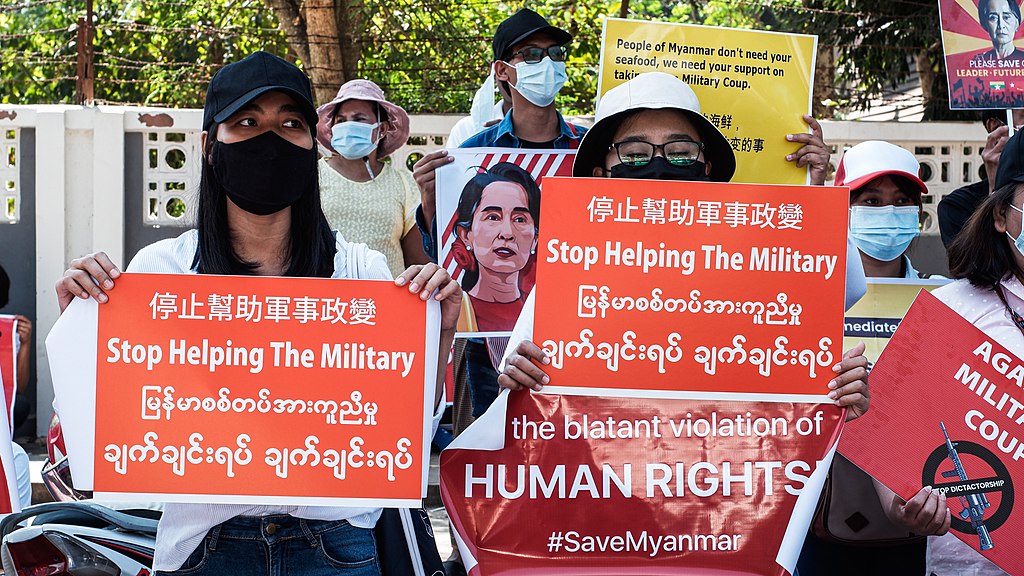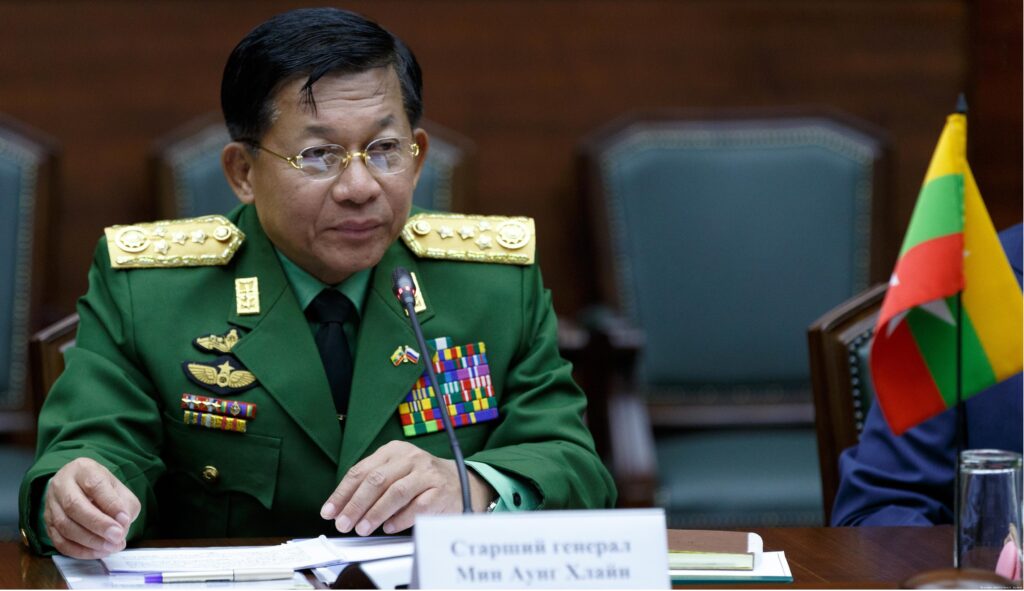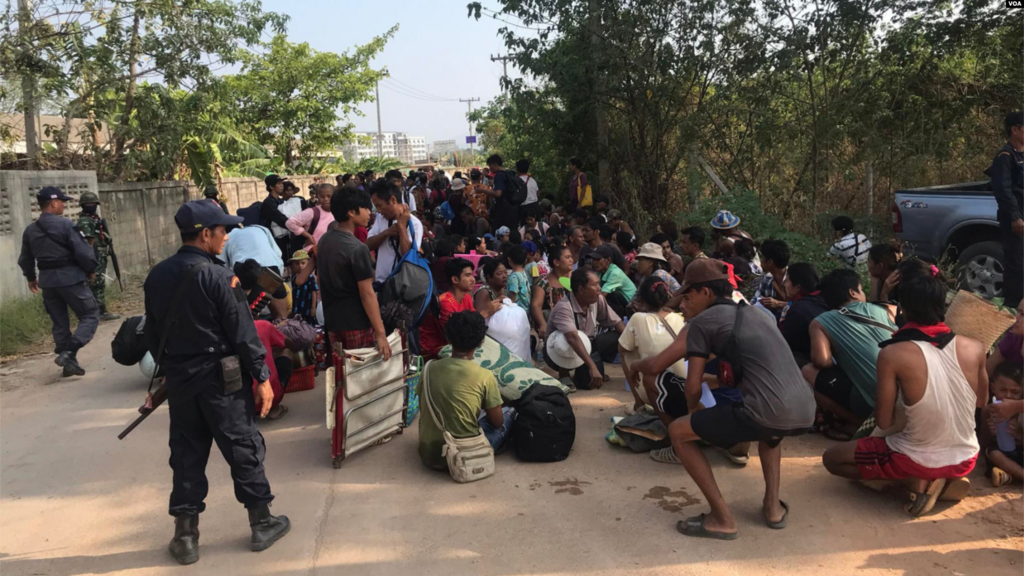Civil War in Myanmar and ASEAN’s Failure to Intervene: An Interview with Professor Erik Martinez Kuhonta

Myanmar has been in civil war since the military junta ousted Aung San Suu Kyi’s pro-democratic National League for Democracy (NLD) in 2021, triggering an armed conflict against the National Unity Government (NUG)—a government-in-exile that includes members of the NLD and other pro-democracy groups. The Association of Southeast Asian Nations’ (ASEAN’s) 2021 “five-point consensus” peace plan has failed to end the violence. I sat down with Professor Erik Martinez Kuhonta, an Associate Professor in McGill University’s Department of Political Science and a scholar of Southeast Asia, to discuss the situation in Myanmar and its implications for ASEAN. The following is a transcript of the interview which has been edited for clarity and length.
Editor’s Note: On March 8, after this interview was recorded, Myanmar’s military junta announced its intention to hold a national election in December 2025 or January 2026.
Aubrey Nan
You’ve previously written an Op-Ed in The Globe and Mail describing the coup in Myanmar as a promissory coup, pointing to the strategy’s success in Thailand. But four years on, the military has still not held promised elections and was unable to complete a census in areas controlled by the National Unity Government. What is the military hoping to achieve by holding elections and is it likely to succeed in those aims?
Erik Martinez Kuhonta
I think everyone is skeptical that the military will be holding elections. They’ve been saying that for quite a while, even on the very day of the coup. One could have thought of it as a promissory coup, meaning the promise of something in the future. But that hasn’t happened. And now we’re four years on, so I think every observer and practitioner is pretty skeptical of what that means.
If it even happens six months down the road or something like that, it would clearly be very manipulated. Min Aung Hlaing, the general who led the coup, was deeply upset that the NLD had trounced the military so decisively in both 2020 and 2015. His whole thing prior to the coup was all about these elections and the Union Election Commission having distorted things in the NLD’s favour. The military knows they cannot win an election that is relatively free and fair. So for sure, if there even is an election, they are not going to allow the opposition to gain any ground. And as it is, the NLD is not going to participate at this point: they’re obviously opposed to any sham election.
In terms of what they are trying to achieve, authoritarian regimes have often said they will hold elections, and then they do. Why do they do that? Partly because they want to project legitimacy that does matter to them. Partly they think that maybe they’re in a bubble, that they actually can win elections, even if those elections are relatively open. And if they manipulate those elections, as many authoritarian regimes do, then they think their manipulation will be enough to still grant them that legitimacy.
In essence, why go through this trouble of elections when you can repress? There is an effort to acquire some degree of legitimacy. Both internally and externally, there is a belief that if the elections are held, whether relatively honest or dishonest, the military will come out of that in a positive vein.

Aubrey Nan
You mentioned that you think they might not even hold elections at all. If they don’t hold the elections, what do you think is the long-term trajectory for Myanmar?
Erik Martinez Kuhonta
If they just keep saying they’ll hold elections, but they don’t actually do anything, I think it’s a very bad, bad direction. It’s a civil war right now, but it’s a civil war that is stalemated. And I think the stalemate will continue indefinitely. It’s gone back and forth, and right now, the military has somewhat more of an upper hand than it did about a year ago when the opposition was gaining significant ground in this really quick way. If elections are not held, the military will continue with their brutality and the NUG is not going to pull back. I mean, it’s very clear the opposition is in it for the long run. The way they’re fighting now is a very different response compared to past crises like 1988. So this will continue if there are no elections and, furthermore, if there is no effective mediation from ASEAN. It’s a stalemate in the long run.
Aubrey Nan
That’s a good segue to talking about ASEAN and Myanmar. ASEAN has a history of non-interference and consensus, and this has led it to be somewhat recalcitrant in the way it addresses the Myanmar conflict. So my question is, what is your opinion on the failure of the five-point consensus peace plan, and why is it that ASEAN has not been either able or willing to move beyond it to coordinate a stronger response?
Erik Martinez Kuhonta
This is very important because the only real actor, other than China, in pressuring Myanmar is ASEAN. So it is significant that ASEAN has failed here. ASEAN’s general tendency is not to intervene. They’ve adhered to the norm of non-interference and hoped that quiet diplomacy will work in crises. In this crisis, ASEAN has taken quite a different tack: they have been much more forceful vis-à-vis the junta, and they quickly came up with this five-point consensus. Most significantly, they did deny Myanmar a seat at ministerial meetings at the ASEAN Summits, so Myanmar can only send bureaucrats and civil servants and not any of the junta’s political representatives. That’s a significant degrading of Myanmar’s participation in these ASEAN meetings, and it is a really big deal for ASEAN.
So ASEAN is pretty serious about trying to find some pathway forward. The five-point consensus plan is trying to be balanced in terms of both parties. It’s calling for cessation of conflict, an ASEAN representative, and dialogue with both parties. But the junta does not want ASEAN to dialogue with both parties. That’s what the stumbling block is: the military does not want to dialogue with the NUG in a balanced manner under the auspices of ASEAN’s plan. That’s a huge problem.
The issue for ASEAN is that Thailand is obviously the country most affected by the civil war because of the tens of thousands of refugees on the border. The extra 40-45,000 stemming from the civil war is in addition to some already 90,000 who have been there for a long time. It’s just compounded. Thailand feels very much in a difficult position here.
So Thailand has actually, in the past years, pursued its own diplomacy to find some way out of this deadlock. And they’re doing it without ASEAN, which ASEAN is not happy about because there clearly is a lack of coordination. In the past year, furthermore, Thailand has set up some meetings only involving the military government, not the NUG. Thailand has broken away from ASEAN’s effort to maintain both parties. And that’s a problem in terms of the opposition accepting that as a path towards some kind of resolution.

Aubrey Nan
That touches on the next thing I wanted to discuss, which is about the challenges of ASEAN coordinating a joint response given that the states within ASEAN are divided on how to approach the Myanmar conflict. Given internal disagreement within ASEAN, is there a path forward for ASEAN to make any progress in Myanmar
Erik Martinez Kuhonta
I don’t think ASEAN has found a formula or a mechanism to unlock this. If there is a path towards some dialogue or elections that ASEAN or Thailand is willing to move forward, that’s not going to be acceptable to the NUG. The NUG will only accept something where there is a balance. Now the military is not going to accept that because the military has no desire to do dialogue at this point. They’re willing to say elections and some degree of stability, etc., but only if they’re calling the shots, and Thailand is somewhat willing to go with that. But that’s not going to work for the NUG. So it’s hard to see where diplomacy works here.
Now, the other path would have been that the military is in significant retreat in terms of territorial control, and that’s where it looked like it was going about a year ago. The military was really losing significant territory across the western, eastern, and the northern sides. Who knows? If the military had been really pushed back to just the central plains, the major cities, maybe the military would have been forced to to negotiate. Maybe.
But that pressure has declined in part because initially, China supported the opposition’s pressure on the junta, as China is unhappy that the military has allowed trafficking schemes and scam centres around the Myanmar-China border. And so, they were happy to support the opposition, whether ethnic armed organizations or other anti-military forces. But in recent months, China has become concerned that if the opposition gains too much ground, Myanmar also becomes very unstable, and they don’t want Myanmar to crumble apart into a very unstable neighbour.
So it seems that China has made it more difficult for the opposition armed forces to be able to coordinate, have communication lines, and get supplies. They’ve blocked off different routes, so that’s made it much more challenging for the opposition to gain ground.
I guess to answer your question: diplomatically, it seems like a stalemate; militarily, a stalemate. Yeah, it’s very hard to see where this goes.
Aubrey Nan
I have just one more question. Given ASEAN’s failure to address the conflict in Myanmar, what does this mean for the future of the international organization, not only in its relationship with Myanmar, but to the challenges it may face in the future, such as with China?
Erik Martinez Kuhonta
Yes, so this is a big deal in terms of ASEAN’s role in not only regional conflicts but also more globally in its relationship to China. ASEAN’s effectiveness in the Myanmar case is pretty bad. But there are other crises that are brewing and the big one right now for Southeast Asia is the South China Sea, or what the Philippines calls the West Philippine Sea. For the Philippine government, this is their number one concern right now. And one of the refrains that Philippine government officials have been making is that they want ASEAN to be more involved. But ASEAN has not been as involved as the Philippine government wants.
So there’s a wider issue here, which is that ASEAN is a very important regional organization and throughout its history since 1967, it has proven to be an important player; but it is also true that in severe crises, ASEAN is hampered by numerous things. And it’s becoming increasingly evident that there is a lack of real collective commitment to a crisis when it doesn’t involve all ten members and might involve only one or two.
Then Thailand, unhappy with the situation at the border and with ASEAN’s inability, goes its own way. The Philippines, unhappy with the West Philippine Sea problem, is trying to get Canada and the United States (at least prior to Trump) much more invested in the issue. And the Philippines has also said, and this is a comment I had asked an official, when Vietnam was also under pressure from China, ASEAN did not rally around Vietnam. So it’s a recurring problem. And increasingly significant, given the hegemonic rise of China in the area.
Featured Image: “Protest in Myanmar against Military Coup 14-Feb-2021 02” by MgHla is licensed under CC BY-SA 4.0.
Edited by Hannah Lalonde
